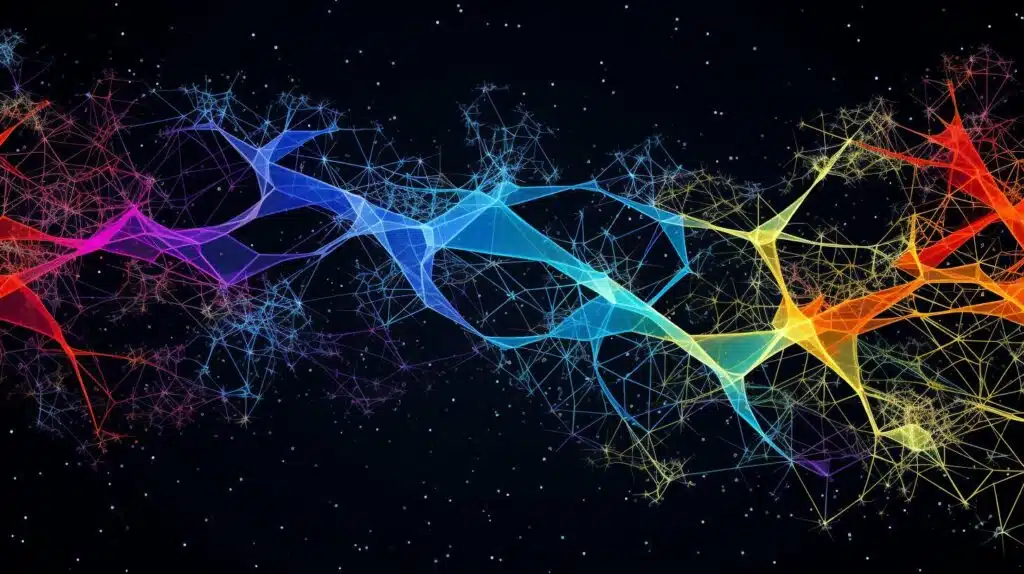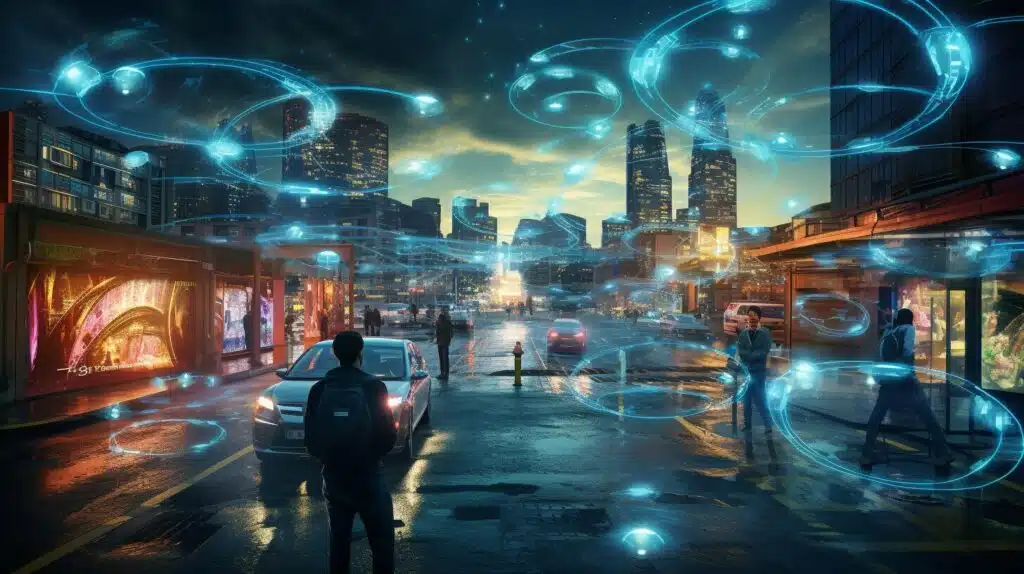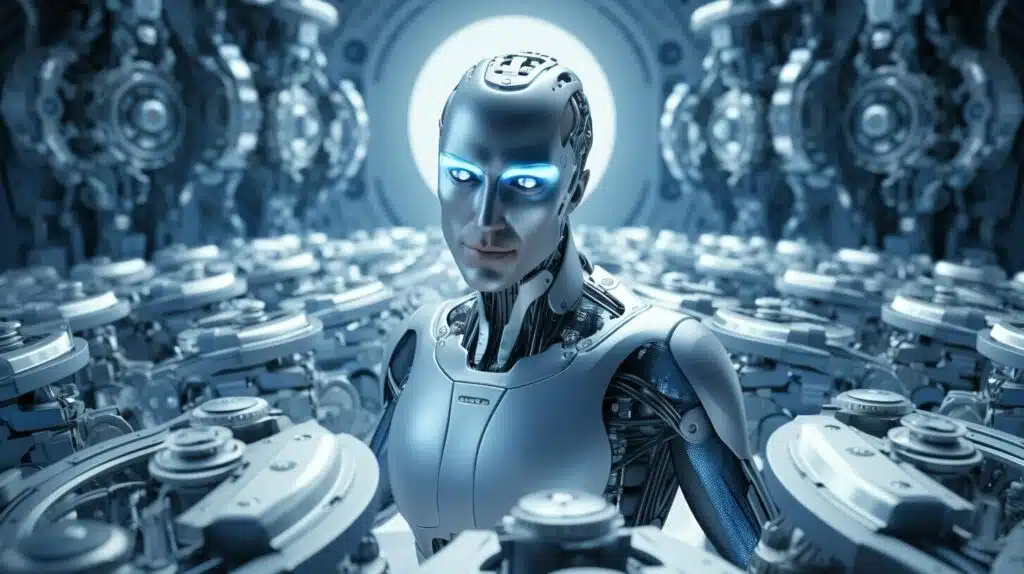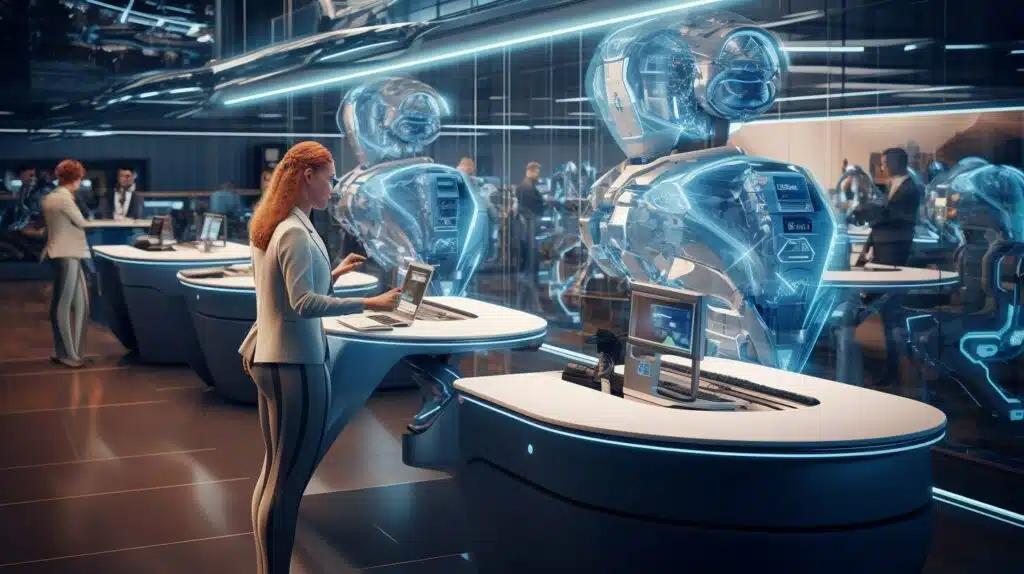Artificial intelligence, also known as AI, is a technology that is gaining more and more interest. But how does it actually work? In this article, we will explore the basics of artificial intelligence, its different applications and the issues it raises.
Artificial intelligence is an attempt to imitate human intelligence using robots or software. It can replace tasks that humans can perform as well as those that surpass them. There are two categories of artificial intelligence: weak (narrow) artificial intelligence that acts similarly to human reasoning and strong (general) artificial intelligence that can think like a human and is not limited to a single task.
What is artificial intelligence?
Artificial intelligence (AI) is a new science, scalable And experimental which aims to imitate human intelligence by performing tasks that are beyond human capabilities. AI has the ability to think, learn, reason, plan, and understand human language in a way similar to a human being. It is based on the logic and is the subject of numerous debates within the scientific community.
Artificial intelligence is still far from becoming a reality practical, but it has many applications potential. It can be used to automate the human tasks, improve performance, and promote the economic growth. In addition, it has the potential to improve the quality of health care and to create a synergy between AI and humans to improve their mutual capabilities.
Despite advances in artificial intelligence, AGI, or artificial general intelligence, which is capable of human reasoning and is not limited to a single task, remains a challenge to achieve. Certain ethical and practical questions must be resolved before AI can become a reality practice. Nevertheless, AI continues to evolve and open up exciting new possibilities for the future.
How does artificial intelligence work?
Artificial intelligence works through the interconnection of a neural network artificial, which is similar to how the human brain works. equations interconnected in the neural network allow the artificial intellectual stimulation, extracting the most important information. Artificial intelligence improves by constantly learning and analyzing data through the machine learning and independent learning.
THE neural network artificial intelligence is composed of several interconnected layers. Each layer processes specific information and passes the results to the next layer. The neurons in each layer perform calculations based on equations complex mathematics to generate results. These results are then used to make decisions, make predictions, and learn new information.
Artificial intelligence also uses the machine learning, which allows systems to learn from data without being explicitly programmed. They can detect patterns and trends in data and use this information to make decisions or predictions. Autonomous learning is another key component of artificial intelligence, where systems can improve and adapt based on experience.
Applications of artificial intelligence
Artificial intelligence has many applications in different fields, such as medicine, finance, industry, transportation and many others. It is used for data analysis, trend prediction, automation of complex tasks and creation of autonomous systems. For example, in the medical field, AI can be used to diagnose diseases, analyze medical images and help in the search for new treatments.
The different types of artificial intelligence
Artificial intelligence can be classified into three main types: artificial narrow intelligence (ANI), artificial general intelligence (AGI), and artificial superintelligence (ASI). Each of these types has its own characteristics and abilities.
Artificial Narrow Intelligence (ANI)
Narrow artificial intelligence, also known as weak artificial intelligence, refers to AI systems that specialize in specific tasks. These systems are designed to perform a single task efficiently, such as speech recognition, data analysis, or autonomous driving. ANI is the most common form of AI in current applications.
Artificial General Intelligence (AGI)
Artificial general intelligence, also known as strong artificial intelligence, is capable of understanding, learning, and performing complex tasks in a manner similar to a human being. AGI has a wide range of SKILLS cognitive and can be adapted to different domains. However, despite the progress made in this field, AGI is still far from being fully realized.
Artificial Superintelligence (ASI)
Artificial superintelligence, often still in the fictional stage, refers to a level of artificial intelligence higher than that of a human being. It would be capable of surpassing the intellectual capacities of man in all areas. ASI poses significant ethical and philosophical challenges and is the subject of debates within the scientific community and technological.
It is important to understand these different types of artificial intelligence to assess their potential applications, their benefits and the ethical implications that arise from it. Each type of AI has its own limitations and capabilities, and it is important to understand them well for the responsible and ethical use of this constantly evolving technology.
What is the purpose of artificial intelligence?
Artificial intelligence (AI) has the main objective of automating tasks that normally require human resources, thereby improving the productivity businesses. With AI, businesses can complete tasks faster and more efficiently, resulting in increased economic growthBy automating certain tasks, companies can also reduce human error and improve the quality of the products and services they offer.
Another major goal of AI is to improve the quality of health care. AI can be used to analyze medical data to detect diseases early and provide more effective treatments. It can also be used to develop surgical robots that can perform operations with extreme precision, reducing risks related to human intervention.
However, the real potential of AI lies in its ability to work in synergy with humans. By combining the strengths of AI and humans, we are able to accomplish complex tasks and solve problems more efficiently. For example, in scientific research, AI can analyze large amounts of data and identify trends or patterns that would be difficult for a human to spot alone. This collaboration between AI and humans offers unprecedented opportunities to innovate and push the boundaries of what we can accomplish.
Some examples of the use of AI in synergy with humans:
- Of the virtual assistants smart devices that help employees complete tasks and answer questions.
- Personalized recommendation systems that provide suggestions tailored to each individual's preferences.
- Chatbots capable of interacting with customers in a friendly and efficient manner.
Through this synergy, we can fully exploit the potential of AI while preserving the essential and unique role of humans in decision-making and creativity.
Applications of artificial intelligence
Artificial intelligence is used in various sectors to optimize processes, improve analyses and automate tasks complex. Here are some examples of applications of artificial intelligence:
- In the IT sector, artificial intelligence is used to develop machine learning and data analysis systems, thereby improving the performance of software and infrastructure.
- In the distribution and logistics sector, artificial intelligence is used to optimize supply chains, predict consumer demand and improve delivery efficiency.
- In the health sector, artificial intelligence is used to analyze medical data, diagnose diseases and assist in clinical decision-making.
- In the customer relations sector, artificial intelligence is used to improve the customer experience by providing personalized recommendations, answering frequently asked questions, and automating responses to customer requests.
- In the automotive sector, artificial intelligence is used to develop autonomous vehicles and improve the security road.
- In the streaming sector, artificial intelligence is used to recommend personalized content to users, based on their preferences and viewing history.
- In the security sector, artificial intelligence is used to detect threats and suspicious behavior, improving monitoring and incident prevention.
Artificial intelligence is playing an increasingly important role in many areas, offering opportunities for efficiency, personalization, and automation. It continues to evolve and develop to meet the growing needs of business and society.
Supervision of artificial intelligence
As artificial intelligence is a constantly evolving technology, it is essential to put regulations in place to ensure its security and its proper development. Thus, the establishment of security protocols and standards become essential to supervise the use of AI.
Aligning the goals of artificial intelligence with those of humanity is also a crucial aspect to consider. Indeed, it is essential that AI systems are designed in a way that is compatible with human values and needs.
The European Union plays an active role in the regulation of artificial intelligence. It collaborates with companies and researchers to fund research and development in the field of AI. This collaboration aims to ensure that technological advances meet the requirements of security and ethics.
Thanks to these measures of regulation, it is possible to promote safe and responsible development of artificial intelligence, while exploiting its full potential to improve our society.
Benefits and Risks of Artificial Intelligence
Artificial intelligence offers many benefits in various fields. First, it enables improved performance in many sectors such as manufacturing, financial services and healthcare. Thanks to AI, machines can perform complex tasks more efficiently, resulting in increased productivity. productivity and one economic growth.
Artificial intelligence also brings a great comfort in our daily lives. Applications such as virtual assistants and the home automation make our environment more convenient and easier to manage. Smart machines can anticipate our needs, simplify household chores, and provide us with a personalized experience.
“Artificial intelligence has the potential to revolutionize healthcare by improving diagnostics, accelerating the discovery of new drugs and facilitating access to care in remote areas.”
However, artificial intelligence also raises concerns and risks. THE autonomous weapons, for example, raise security and ethical issues. There are also concerns about the impact of AI on the labor market, which could lead to job losses and inequalities socio-economic. In addition, inappropriate or malicious use of artificial intelligence can compromise the political and social stability.
It is therefore essential to take measures to minimise the risks associated with artificial intelligence, while using its benefits to improve our lives. The AI regulation, awareness of its implications and close collaboration between key stakeholders are necessary to ensure responsible and beneficial development of this promising technology.
AI in the enterprise
Artificial intelligence (AI) plays an increasingly important role in businesses, offering many opportunities for the digital transformation, optimization of the productivity and improved customer service. With AI, businesses can automate repetitive and time-consuming tasks, freeing up employees to focus on more strategic and higher-value tasks.
Optimizing productivity is one of the main benefits of integrating AI into the business. AI algorithms can analyze large amounts of data and identify valuable patterns and trends. These insights can help businesses make informed decisions, predict future outcomes, and optimize their work processes. AI also helps improve operational efficiency by identifying bottlenecks and proposing solutions to resolve them.
There data security is a major concern for all businesses. AI can play a vital role in data protection, detecting security threats and preventing potential attacks. AI algorithms can analyze suspicious activity patterns and identify malicious behavior, ensuring the security of sensitive information.
Finally, AI can greatly improve the customer experience. Through predictive analytics and personalized recommendations, businesses can provide products and services tailored to each customer’s specific needs. AI can also improve the responsiveness and availability of customer service by automating answers to frequently asked questions and providing instant assistance via chatbots.
“Artificial intelligence offers companies new opportunities to transform and adapt to market changes. By integrating AI into their strategy, companies can gain in efficiency, competitiveness and customer satisfaction.”
Progress and projects in artificial intelligence
Artificial intelligence continues to make impressive strides across various projects and applications. Here are some of the areas where AI is constantly evolving:
- Online shopping platforms: THE online shopping platforms use artificial intelligence to analyze user preferences and offer them personalized recommendations. This facilitates purchasing processes and improves the customer experience.
- Virtual Assistants: THE virtual assistants, such as Siri and Alexa, are common examples of artificial intelligence. These systems use sophisticated algorithms to understand and respond to users' voice commands.
- Home automation: Artificial intelligence is also used in home automation systems to automate and control home devices. This allows users to easily manage their lighting, heating, security, etc.
- Autonomous robots: THE autonomous robots are able to make decisions and perform tasks without human intervention. They are used in different fields such as industry, medicine, space exploration, etc.
In addition to these projects, artificial intelligence is also widely used in performance analysis, whether in sports, business or medicine. AI algorithms are able to analyze large amounts of data and provide valuable insights to improve performance and make informed decisions.
Thanks to these advances and these projects, artificial intelligence continues to transform our daily lives and open new perspectives for the future. We can expect greater advances in the years to come, with ever more varied applications and even more efficient systems.
Conclusion
Artificial intelligence is a constantly evolving technology that presents both benefits and risks. Its development requires a regulation to ensure its security and alignment with human objectives. In the business field, the integration of AI promotes the digital transformation, optimizing productivity and improving customer service.
Advances in artificial intelligence have enabled the implementation of projects such as online shopping platforms, virtual assistants, the home automation and the autonomous robotsThese advances aim to facilitate daily tasks and improve the performance of systems and machines.
Artificial intelligence opens up new perspectives for the future, while raising debates and reflections on its ethical, social and economic implications. It is crucial to continue to explore this technology responsibly and cautiously, in order to maximize its benefits and minimize its potential risks.
FAQ
How does artificial intelligence work?
Artificial intelligence works by using a network of artificial neurons that mimic the functioning of the human brain. It uses equations interconnected in this network to extract important information. AI improves by constantly learning and analyzing data through the machine learning and independent learning.
What is artificial intelligence?
Artificial intelligence is a new science, scalable And experimental which attempts to imitate human intelligence by performing tasks that humans can do, as well as those that surpass them. It can think, learn, reason, plan, understand human language, and demonstrate logic. However, its development is still ongoing and is the subject of debate in the scientific community.
How does artificial intelligence work?
Artificial intelligence works through the interconnection of an artificial neural network. The interconnected equations in the neural network allow the artificial intellectual stimulation, extracting the most important information. AI improves by constantly learning and analyzing data through machine learning and autonomous learning.
What are the different types of artificial intelligence?
There are three types of artificial intelligence. Artificial Narrow Intelligence (ANI) is used in specific applications. Artificial General Intelligence (AGI) is comparable to human intelligence and can perform complex tasks. artificial superintelligence (ASI) surpasses the human intellectual level but has not yet been developed.
What is the purpose of artificial intelligence?
The goal of artificial intelligence is to improve business performance and productivity by automating tasks that normally require human resources. It can also improve the quality of health care and promote a synergy between AI and humans to improve their mutual capabilities.
What are the applications of artificial intelligence?
Artificial intelligence is used in many industries such as IT, distribution and logistics, healthcare, customer relationship, automotive, streaming and security. It helps to optimize processes, improve the accuracy of analyses, personalize recommendations and automate tasks complex.
How to frame artificial intelligence?
It is essential to put in place security protocols and to regulate artificial intelligence to ensure its safe and human-aligned development. The European Union is working to help guide AI and is working with companies to fund research and development in this area.
What are the benefits and risks of artificial intelligence?
Artificial intelligence offers many benefits such as improved performance, comfort and some SKILLS, as well as opportunities for economic growth and improved quality of health care. However, it also presents risks such as the use of autonomous weapons, disruptions on the labor market, of the inequalities and problems of political and social stability.
How is artificial intelligence integrated into the business?
The integration of artificial intelligence in the company promotes the digital transformation, productivity optimization, data security and the performance of predictive analyses. It also improves customer service by enabling faster order processing and personalized services.
What are the progress and projects in artificial intelligence?
Advances in artificial intelligence continue with projects such as the online shopping platforms, virtual assistants, the home automation and the autonomous robotsThese projects aim to simplify daily tasks and improve the performance of systems and machines.











